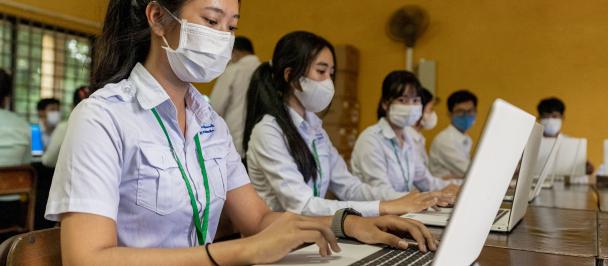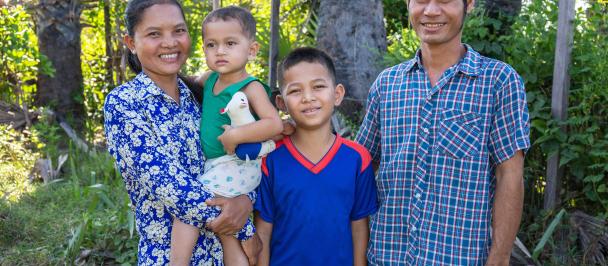Remarks by Ms. Alissar Chaker, Resident Representative, UNDP Cambodia
Launch of the 2025 Human Development Report in Cambodia “A Matter of Choice: People and Possibilities in the Age of AI”
June 19, 2025

• Excellency CHEA Vandeth, Minister of Post and Telecommunications,
• Excellency Dr. Ing Kantha Phavi, Minister of Women's Affairs
• Excellencies, Representatives of the Royal Government of Cambodia, Development Partners, Civil Society, and Youth Groups,
• Colleagues and Distinguished guests.
Chum reap sour, and a very warm welcome to you all.
The Human Development Report is an annual flagship publication by the United Nations Development Programme (UNDP) to highlight new signals and examine the latest trends impacting human development. It is done through a multifaceted lens, focusing on expanding people's choices, freedoms and opportunities for a healthy life, access to knowledge, and a decent standard of living that goes beyond monetary considerations. It is known for its independent editorial focus, which has been shaped in the past and continues to inspire global, regional, and national analyses, policy dialogues, and development pathways. This year’s report, titled “A Matter of Choice: People and Possibilities in the Age of AI”, launched on 6 May 2025 in Brussels, Belgium, addresses an increasingly eminent topic that is conditioning and revolutionizing our lives in times of peace and war.
Today we are proud to bring this conversation to Cambodia and deliberate with esteemed policymakers, academics and representatives of civil society, development partners, UN Agencies and youth groups the power and possibilities of AI in Cambodia, the opportunities for leveraging AI to accelerate human development as per the Pentagonal Strategy Phase I: 2024-2028, and the choices needed that will define the legacy of AI for human development in the Kingdom. Together, we aim to foster a shared understanding of the transformative power of AI technology for use by people, “all the people”, instead of competing with it.
Excellencies, Partners, and Distinguished Guests,
The 2025 Report comes when the world stands at a crossroads. Globally, we are witnessing a historic slowdown in human development progress. According to the report, the projected increase in the Human Development Index in 2024 is the smallest since the index was introduced in 1990, except during the pandemic years of 2020 and 2021. This is not just a statistical deviation but a wake-up call. It tells us that the world is not only recovering slowly from recent crises but also at risk of long-term stagnation if we do not act decisively.
The report also highlights the growing inequality between countries. The gap between low and very high human development countries (HDI) has widened for the fourth consecutive year. Traditional development pathways, based on industrialisation and export-led growth, are narrowing, particularly for countries in the least developed regions. Many of the poorest countries in the world are currently facing the triple squeeze of the increasing rise of jobless industrialisation, a worsening debt crisis and trade tensions. These dynamics are not only stalling progress but actively pushing the most vulnerable farther behind.
Excellencies, Partners, and Distinguished Guests,
Amidst these challenges, the rapid rise of AI represents a defining force that will shape our future. The pace at which AI is advancing is astonishing, quickly transforming how we work, learn, communicate, and make decisions. However, as the report stresses, the cornerstone is not just what AI can do, but what we choose to do with it. Will AI widen inequality, or will it be a means to expand human freedom, dignity, and opportunity?
The 2025 HDR contains the results of a new survey that revealed that people are realistic yet hopeful about the change AI can bring. AI is already becoming part of daily life for many: only 18% of respondents globally said they know nothing about AI, and about one in five of the remaining are already using it in fields like education, health, and work. While five out of 10 survey respondents expect AI to impact or replace their jobs significantly, six in ten believe it will create new job opportunities. Confidence in AI’s potential to boost productivity is particularly strong in low and medium human development countries, where 70% of respondents expect productivity gains and 64% anticipate new job creation.
This optimism is essential. It suggests that people are receptive to engaging with AI but also implies that governments and development actors must act swiftly to provide the proper framework, such as skills, infrastructure, and ethical safeguards, to ensure AI works for all.
Excellencies, Partners, and Distinguished Guests,
Cambodia’s development journey is a powerful example of the promise of potential. Since 1990, Cambodia’s HDI has grown by 57%. Since then, life expectancy has increased by more than 15 years. Educational attainment has significantly improved as expected years of schooling have increased by over four years, and the mean years of schooling have increased by more than two years. The Gross National Income per capita has surged by more than 300%. As of 2023, Cambodia’s HDI stood at 0.606, placing the Kingdom in the Medium Human Development category, ranking 151 out of 193 countries and territories. These milestones are not just numbers- they represent meaningful improvements in people’s lives and wellbeing.
However, the road ahead is complex and tumultuous. The rapid digital transformation, the worsening climate crisis, growing geopolitical uncertainties and the heightened risk of trade wars require adaptability and forward-thinking. We often seek innovative approaches to foster and accelerate development during challenging times. AI is a rapidly evolving option, with great potential for driving progress in Cambodia. It offers promising opportunities to accelerate the achievement of national ambitions as laid out in the Pentagonal Strategy, Vision 2030, and Vision 2050. Nevertheless, we also recognise that AI is not the panacea; it is all about today's choices that will precondition the future of growth and the pathways for human development in Cambodia.
That is why today’s event is so important. The event is not merely a launch but a platform for dialogue that we hope will last and inform national reflection. We invite you to explore how AI can help us map vulnerabilities, improve public services, enhance productivity, accelerate women's empowerment, and spark innovation within a framework that upholds human rights, ethics, and inclusion. This conversation is guided by the values that are at the heart of human development - expanding people's choices, rights and freedoms.
I invite you to approach today’s discussions with an open mind, critical thinking, and a shared sense of purpose that reaffirms our collective commitment to human development in Cambodia.
In closing, I would like to extend UNDP’s sincere appreciation to the Minister of Post and Telecommunications and his team for their leadership in advancing Cambodia’s digital transformation, which is essential for enabling and accelerating development. We value our strong partnership and bank on wide avenues of collaboration with you as we navigate this new frontier together.
Thank you again, Excellencies, partners, and distinguished guests, for joining us today. I look forward to a rich and inspiring dialogue.
Thank you very much. Som Arkun!

 Locations
Locations

